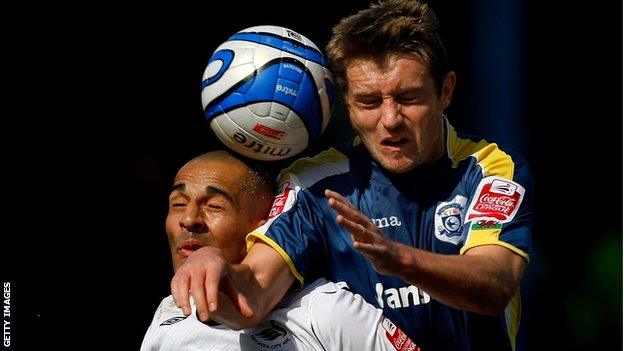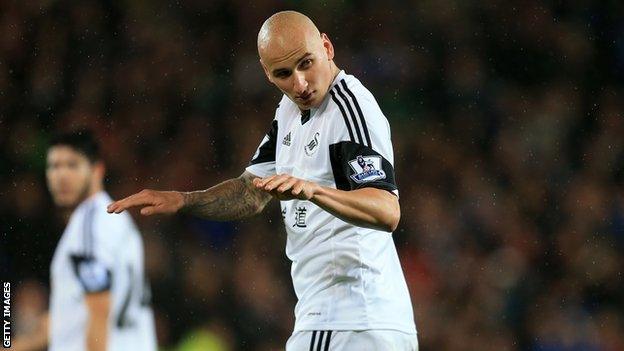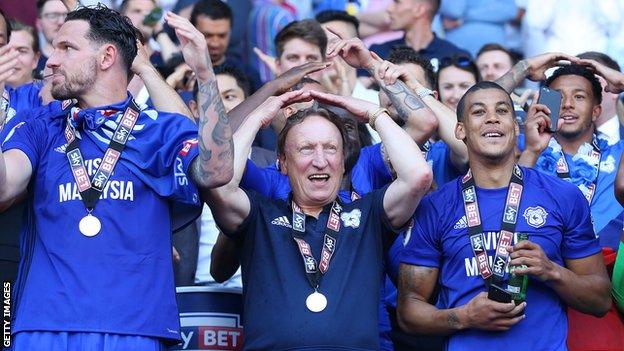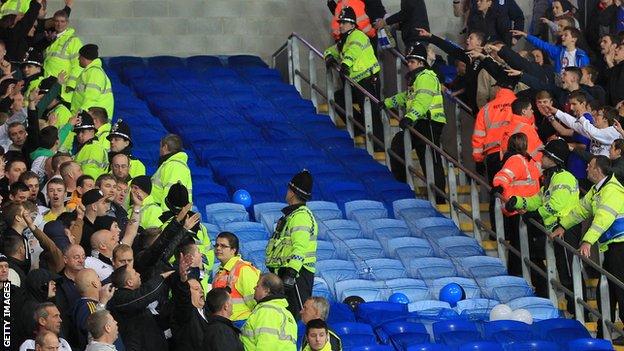Swansea City v Cardiff City: The 'can't-lose' south Wales derby
- Published
'It means everything': Swans and Bluebirds prepare for south Wales derby
Championship: Swansea City v Cardiff City |
|---|
Venue: Liberty Stadium, Swansea Date: Sun, 27 Oct Kick-off: 12:00 GMT |
Coverage: Full commentary BBC Radio Wales and Radio Cymru, plus text updates on the BBC Sport website and app. |
The biggest Welsh club game of the season takes place on Sunday when Swansea City host arch rivals Cardiff City in the Championship. BBC Sport Wales' Gareth Vincent examines what makes this fixture so special, hotly-contested and eagerly anticipated.
"There are players being physically sick, hiding in corners, saying prayers," says David Giles, the former midfielder who played on both sides of the south Wales divide.
"You wouldn't believe what goes on in the changing room. It's whatever you have to do to deal with the pressure."
Giles was born in the Welsh capital, so has been aware of the rivalry between Cardiff City and Swansea City since his primary school days.
But you do not have to be local to know what this meeting of Wales' two biggest cities means.
Whether signing for Swansea or Cardiff, players very quickly learn of the need to topple the neighbours.
"I lived in the Vale (of Glamorgan)," says Dubliner Stephen McPhail, a Cardiff player between 2006 and 2013.
"I would be taking my kids to school and parents would talk to me about the derby. You could feel the tension in the air."
The derby build-up brings anticipation and apprehension in both the white and blue corners.
Come the aftermath, the contrast in emotions is stark.

Stephen McPhail (R), seen competing here with Swansea's Darren Pratley, was sent off twice in four south Wales derby appearances
"Everybody's looking forward to it," says Swans legend Alan Curtis, "and not looking forward to it at the same time."
"If you win you go out and nobody buys any drinks - it's a free house. But lose and you hide away. It's a game you can't lose."
Friends to foes
When Swansea City - then Swansea Town - were formed in 1912, the first thing they did was play a Southern League game against Cardiff.
For decades there was no animosity between the clubs, with some fans watching Cardiff at home one week and Swansea the next.
"When Cardiff got to the FA Cup final in 1927, Swansea sent them a message of good will," says former BBC Wales football commentator and Cardiff historian Richard Shepherd.
"In 1949, Cardiff played Swansea for the first time in a league match in 19 years and there were 57,100 people at Ninian Park.
"It used to attract very big crowds and there was no segregation. There wasn't the unpleasant rivalry then."
Like Shepherd, Swans historian Gwyn Rees got his first taste of the derby in the early 1960s.
"In those days it was always good natured - all the crowds mixed," he says.
"My first derby was in 1964. A Swans fan ran onto the pitch before the game and stuck a wooden swan on a stick on the centre spot.
"Seconds later a Cardiff fan ran on and simulated a lewd act with the swan. It was funny - but it was a different time."
Rees points to the Welsh Cup final in 1969 between the sides as the moment when things started to change.
"The supporters' bus we were on at Ninian Park had a window smashed by a brick. That was the first sign that it had gone past a bit of banter and fun," he says.
"At the same game, one of the boys was wearing a butcher's apron - a big white coat. He had written all the names of the Swansea players on it. He had that coat dragged off him by Cardiff fans."
These were minor incidents compared to what was to come.
"Some of the problems started when John Toshack came to Swansea and took them from the Fourth Division to the First," says Shepherd.
"There was success at Swansea and there wasn't at Cardiff. All the publicity went Swansea's way and the extreme Cardiff fans didn't like that."
Troubled times
The history of the south Wales derby features a succession of infamous off-field events, many of which came during a particularly potent period.
Former Swansea midfielders Darren Pratley, from Barking, and Romford-born Jonjo Shelvey have 'done the swim away' on recent derby days.
This gesture is a reference to an incident after Cardiff won a League Cup tie at Swansea's old seaside home, Vetch Field, in September 1988.
The South Wales Evening Post reported at the time that about 50 Swansea fans chased around 30 of their Cardiff counterparts into the Bristol Channel.
"It was quite comical to watch," a dog walker told the newspaper. "Eventually, the police managed to get the Swans fans away and the Cardiff fans came out of the sea looking like drowned rats."

Jonjo Shelvey was reminded of his responsibilities by the Football Association after performing the swim-away gesture when Swansea lost at Cardiff in 2013
While Swans fans do swimming motions, the trademark gesture for Cardiff supporters and players alike is the Ayatollah.
Though it has nothing to do with Swansea, the Ayatollah - the tapping of hands on head - never goes down well in south west Wales.
Why do Cardiff's fans do it? The story goes back three decades, and a Cardiff punk band called U Thant.
"A lot of our fans were also Cardiff supporters," says Steve 'Frog' Jenkins, U Thant's drummer.
"There was a big connection - a bit of a cross between football and punk - and our singer, Rhys Boore, was a big Cardiff fan.
"We were notorious for doing outlandish stuff. Our gigs were unruly - people would come up on stage and get on the microphone.
"At one gig, at Chapter in Cardiff, Phil Stead - who was one of our fans - got up and started chanting and tapping his head.
"There had been a lot of news footage at the time of Iranians doing it as they were mourning the death of the Ayatollah Khomeini.
"There was no real connection. I think it was just something that amused people and it took on a life of its own."
A Fourth Division draw at Lincoln in 1990 is pinpointed as the game at which the Ayatollah was first performed by Cardiff fans.

Cardiff manager Neil Warnock does the Ayatollah alongside his players after securing promotion in 2018
The following year, Swansea beat Cardiff in the FA Cup at the Vetch on a particularly ugly derby day which is remembered for damage done to trains, buses and shop fronts.
"The fans would spill on to the pitch during games - they didn't have the technology they have now to deal with it," says striker John Williams, a former fans' favourite at both Swansea and Cardiff.
"They would fight in the streets, the train station and all the way down the motorway.
"The fans wanted to show they were the better city. That passion has never changed."
In 1993 came the so-called 'Battle of Ninian Park', when a decision to house Swans supporters in a section of the grandstand backfired.
"It was silly to put them there," says ex-Cardiff star Jason Perry.
"You had a family section in front of them and to the side. My wife was pregnant at the time and she was sat up there. Chairs were being thrown.
"I said to the referee, 'Either you take us off the pitch or I am leaving the pitch to go and sort it out'. Thankfully it calmed down."
Away supporters were banned from the majority of derby games over the next four years, with bubble trips - where away fans can only travel on official buses with a police escort - then introduced in a bid to prevent trouble.

Cardiff City and Swansea City fans during the first Premier League south Wales derby in 2013
"The ban was disappointing because of what it did to the atmosphere," says Swans legend Roger Freestone who, with 20 appearances, has played in more south Wales derbies than anyone.
"Both sets of supporters are fantastic, but you get a few idiots who spoil it.
"I remember the 1991 game at the Vetch. I spent the entire second half on the edge of my box because I was getting stuff thrown at me from the away end.
"It was like the Alamo except it was coins rather than arrows. The groundsman counted up the money afterwards - I think there was £165."
Crossing the divide
Swansea's current squad features two players, Wayne Routledge and Declan John, who have also played for the Bluebirds, while ex-Swans Jazz Richards and Brian Murphy are at Cardiff.
It is never easy for a player who has represented one of Welsh football's heavyweights to join the other.
"People don't expect you to go to the opposition," says Giles, the Cardiff boy who scored a derby winner for the Swans in 1980.
"I don't walk around with a T-shirt saying I scored that goal, but I certainly get reminded about it."
Curtis went the other way, joining Cardiff in 1986.
"The first season at Cardiff was one of the hardest of my career," he says. "When we played the Swans, I got booed by both sets of fans when they announced the teams.

Alan Curtis (L) is a Swansea City legend despite having a spell at Cardiff City, where he eventually won over the fans
"It was a good job my father was in the stands, he was the only one giving me a clap."
How much does the derby mean?
To a large extent, of course, the question of which derby carries most significance depends on which part of the world you are in.
But when British football's biggest rivalries are discussed, the clash of Wales' top two warrants a mention.
"I have played in the Merseyside derby and for Wales against England," says former Swansea and Everton centre-back Ashley Williams.
"The south Wales derby is right up there - if not the top one - in terms of intensity."
Routledge played for Cardiff against Swansea in 2008, and was on the other side for the two Premier League derbies in 2013-14.
"I was involved in Newcastle-Sunderland which is very hairy, and Palace-Brighton for me is big because I grew up there, but I think this is the feistiest one," he says.
"What does it mean? A lot."
Routledge scored in the most recent derby, a 3-0 Swans victory which was Garry Monk's first game as their boss after a long stint as club captain.

Wayne Routledge (L) celebrates with Garry Monk at the end of the latter's first game as a manager, Swansea's comprehensive win over Cardiff in 2014
"They are great games - I loved every moment of them," Monk says.
"The key is not to lose your home game. You can maybe lose one away. That is still bitter to taste, but you definitely can't lose at home."
What does it take to succeed?
McPhail won, lost and drew in his four derby appearances - and got sent off in the first two.
"My first red card was quite unlucky," he says, "but the second one, I probably got wrapped up in the occasion.
"Having a balance is key. You have to feel the tension and play on the edge, but it's got to be controlled as well.
"That's a key thing for the manager to get across. You have to keep cool and play the game but also make your tackles, get the crowd on your side and win your personal battle."
Perry, a Cardiff fan who hails from Bedwas, used to get irritated when former Bluebirds manager Dave Jones played down the significance of the derby.
"He used to say it's like any other game. He was wrong. That was a lack of passion on his part," Perry says.
"For the first 10, 15, 20 minutes, maybe 90 minutes, it was war, then you shook hands for 20 seconds at the end.
"You had to win your battle and now and again football would break out."
This weekend's derby will involve a clash of styles, with Swansea desperate to keep possession and Cardiff happy to win games without the ball.

Jason Perry (R) is a fans' favourite at Cardiff City having played for the club between 1987 and 1997
"Under Neil Warnock Cardiff are very direct. They are hard to beat and hard to break down," says John Williams.
"Swansea play better football - they pass, they move and they interchange, but will they be up for the fight? That's what the derby is all about."
Routledge is the wise old head in Swansea's current squad, but says the derby can make even the most experienced players feel like novices.
"It's as if you are starting all over again," he suggests.
"It's like when you are first starting as a pro and you get your debut. There are goose pimples.
"You get the noise, the atmosphere and everything that goes around it, then the ref blows the whistle and all of a sudden it's a game of football."
No double winner
It says something about the competitive nature of this fixture that neither club has ever won both league meetings in the same season.
"That's how tight they are," says Curtis. "I don't expect it to be any different this time."
Swansea have home advantage and Cardiff are yet to win on the road in 2019-20, but then Cooper's side have lost form after a spectacular start to the season.
Cardiff, meanwhile, have lost only one of their last 10 league games after a sluggish start to the campaign.
So who will triumph?
"Derby day is about whoever shows up," Routledge says. "It's about who has the most courage."
Can't see this selector? Visit this page.
All pictures via Getty Images.